Top Dental Implant Materials: Types, Benefits, Consideration
Dental implants are a popular solution for replacing missing teeth, offering a permanent and natural-looking alternative. The material used for the implant plays a crucial role in its strength, durability, and compatibility with the surrounding bone and tissue. In this article, we will explore the different types of dental implant materials, helping you understand their unique benefits and how to choose the best one for your needs.
Learn about Dental Implant Materials
A dental implant is a modern tooth replacement solution that involves surgically placing a metal post, typically made of titanium, into the jawbone to serve as a sturdy foundation for a replacement tooth or bridge. The implant acts like the root of a natural tooth and provides a strong, permanent base for either fixed or removable artificial teeth.
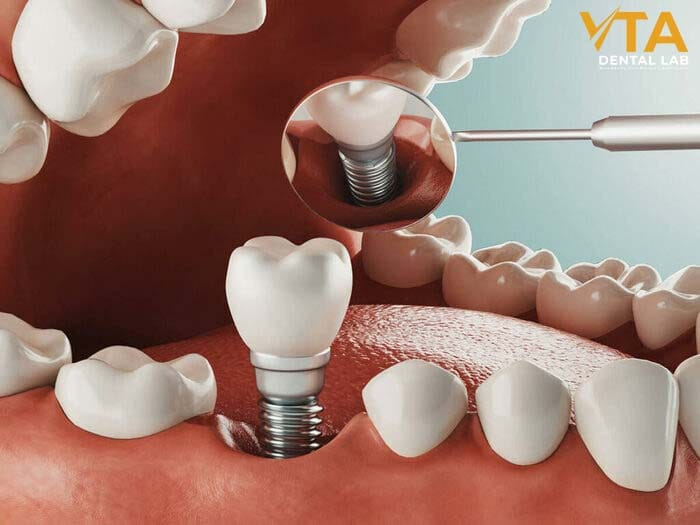
Dental implants are the solution for replacing missing teeth
Dental implants are known for their durability, improved appearance, and ability to restore normal chewing and speaking functions. They also help preserve jawbone density, preventing bone loss that can occur after losing a tooth.
The best dental implant materials used today
Titanium
For many years, the medical industry has used titanium materials for many clinical applications such as hip and knee replacement. In the dental field, with the advantages of durability, lightness, and good corrosion resistance, titanium has become one of the most popular dental implant materials, with a long-term success rate of about 95%.
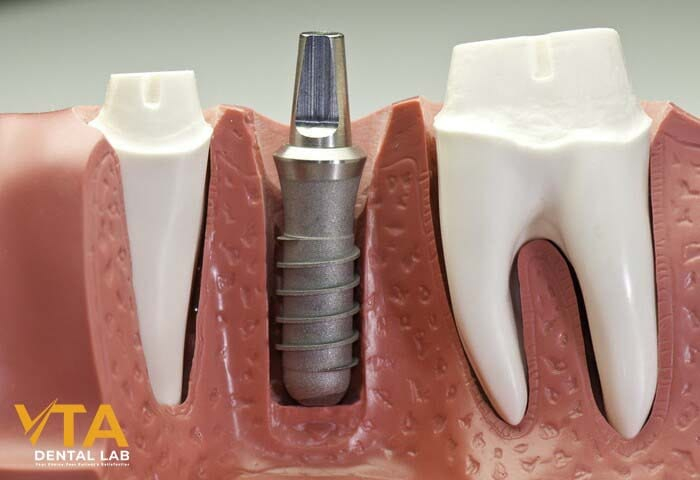
dental-implant-material-2
Benefits of choosing titanium dental implant materials
Strength and durability
Titanium materials in implants support the bite of the jaw and can withstand the impact force during chewing and other daily activities. This durability ensures that dental implants made of titanium can last for decades
Lightweight
Dental implants are a method of completely replacing lost teeth, and patients need to wear them for a long time. Although the strength of titanium alloy is similar to steel, this implant material is about 45% lighter.
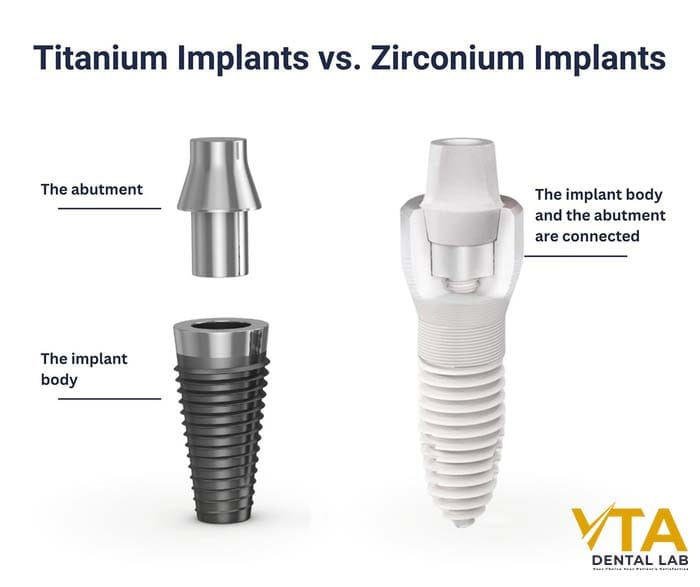
dental-implant-material-3
High biocompatibility
Titanium is an implantable dental implant material that exists in the human body but does not cause unwanted allergic or immune reactions. When titanium is implanted into the jawbone, the process of osseointegration takes place.
This contact does not cause damage or disturbance. When the implant is seamlessly integrated with the jawbone, it provides the new tooth with a solid and stable foundation.
Corrosion resistance
Titanium is known as the most corrosion-resistant material because it can create a protective layer of oxygen around the surface. This helps the tooth resist many harmful substances that can damage the implant.
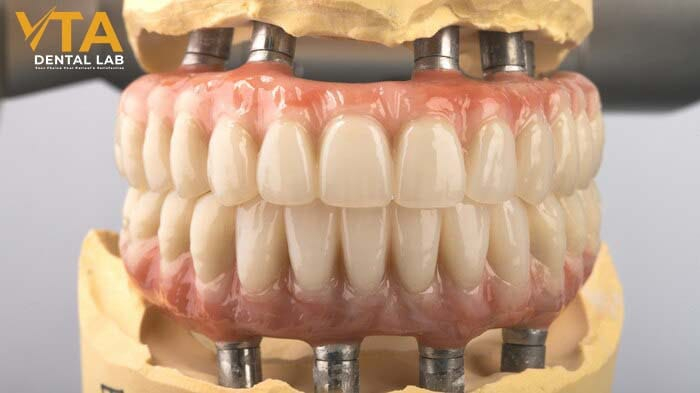
dental-implant-material-4
Customizable
Titanium dental implants have 2 parts, including the implant post and the abutment located on top of the post, which acts as a connection for the artificial tooth. These parts can be customized for patients with bone problems.
Zirconia
Patients looking to replace damaged or missing teeth with non-metal restoration options will turn to zirconia implants.
Benefits of Choosing Zirconia Implants
Dental implants made of zirconia material bring many benefits to oral health, specifically as follows:
Biocompatibility
Zirconia is highly biocompatible, meaning it integrates seamlessly with human tissues. This reduces the chances of adverse reactions such as allergies or inflammation, making it a safer option for patients with metal sensitivities or those seeking a hypoallergenic solution.
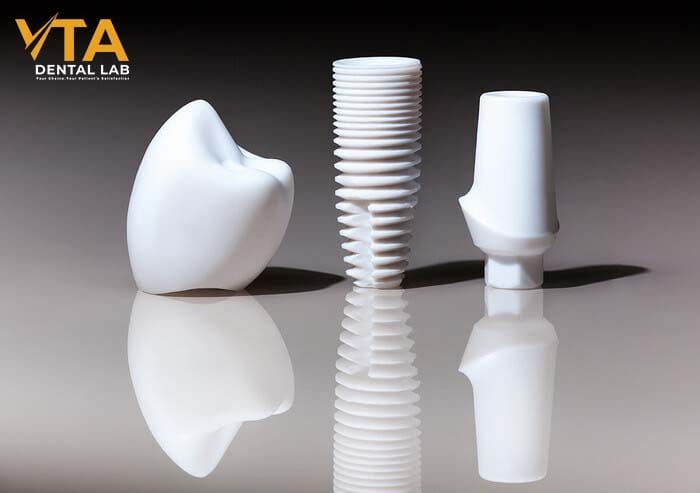
dental-implant-material-5
Strength and Durability
Zirconia is an extremely strong and durable material. It can withstand the pressures of chewing and biting without fracturing or chipping. This toughness ensures that Zirconia implants can provide long-lasting support for dental restorations, maintaining their structural integrity for many years.
Corrosion and Heat Resistance
Unlike metal implants, Zirconia does not corrode or react to changes in temperature. This means it does not conduct heat or electricity, offering more comfort, especially for patients with sensitivity to hot and cold foods. Additionally, its corrosion resistance enhances its long-term stability in the mouth.
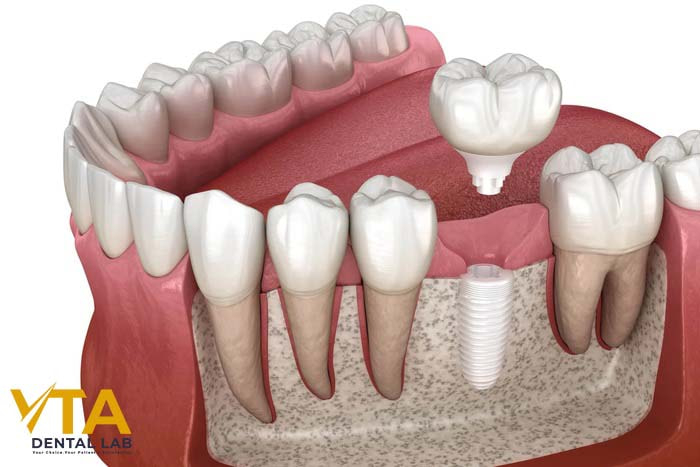
Offer an Aesthetic Benefit
One of the standout features of Zirconia implants is their natural tooth-like appearance. Unlike titanium, which is gray, Zirconia is white, closely resembling the color of natural teeth. This makes it especially beneficial in areas where aesthetics are critical, such as the front teeth, as it minimizes the risk of the dark color showing through the gum tissue.
Are there any alternatives for dental implant materials?
In addition to titanium and zirconia, which are the most common dental implant materials, there are a few other alternative options:
Ceramic Implants: Like zirconia, ceramic implants are another metal-free option. They are particularly valued for their aesthetic appeal, especially for those who need implants in the front of the mouth where visibility is important. Ceramic implants also tend to be highly biocompatible and suitable for patients with metal sensitivities.
Alternative Metals: Other metals that can be used for dental implants include gold, silver, and cobalt-chromium. While these materials are considered durable alternatives, their success rates are generally lower than those of zirconia and titanium.
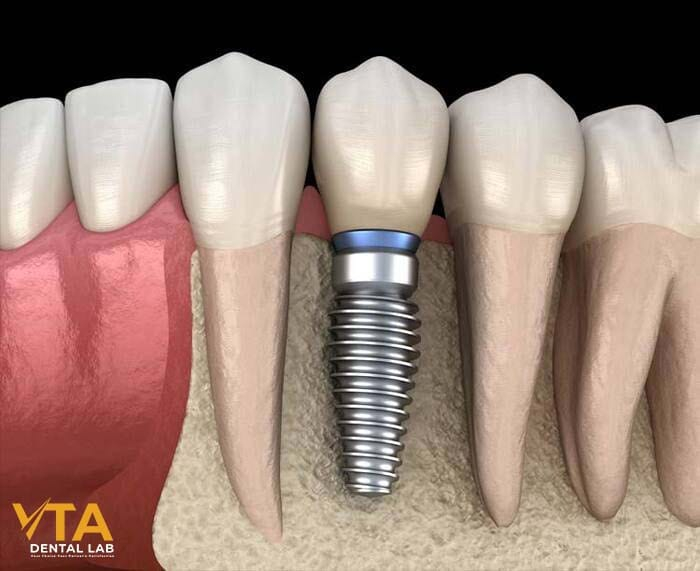
Looking for A Full-Services Dental Lab in the USA
VTA Dental Lab is your trusted partner for comprehensive dental restoration solutions. Specializing in dental implants, we provide high-quality, custom-crafted implants designed to restore both function and aesthetics. Our expert technicians use advanced technology to ensure a perfect fit, durability, and precision for every case.
In addition to dental implants, we offer a wide range of other dental products, including crowns, bridges, dentures, veneers, and orthodontic appliances. At VTA Dental Lab, we are dedicated to supporting dental professionals with reliable, cutting-edge solutions to meet the diverse needs of their patients.